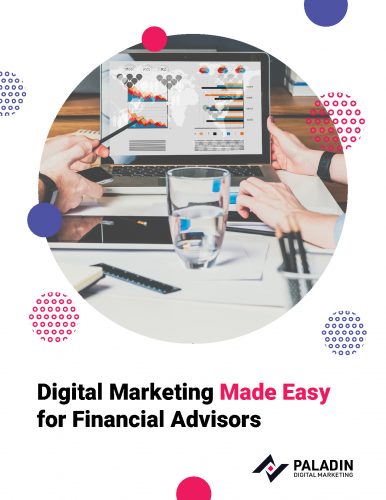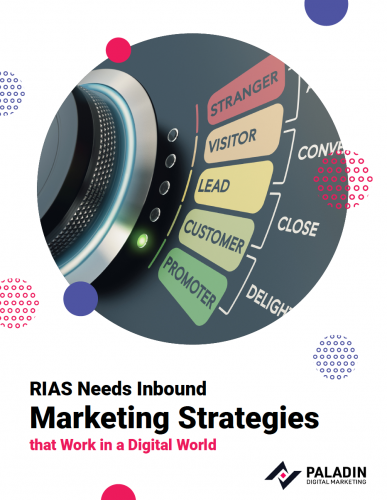Virtual Marketing in the 2020’s
Based on recent events, more financial advisors are thinking about virtual marketing strategies that produce leads, contacts, and clients.
Virtual marketing is becoming more popular due to the pandemic that impacts traditional face-to-face interactions between investors and financial advisors.
Virtual marketing is not just traditional marketing without the face-to-face contact. The foundation for this type of marketing is the information that investors have access to on the Internet. Investors will use the Internet to find, research, and contact financial advisors. What they see will impact who they select.
Table of contents:
Click on any topic to review that specific information.
Coronavirus
 There is a good chance the Coronavirus will change the way investors interact with financial advisors. In particular, advisors they don’t know.
There is a good chance the Coronavirus will change the way investors interact with financial advisors. In particular, advisors they don’t know.
In the past, advisors would initiate contact with investors and schedule face-to-face meetings. The location of the meeting could be at the advisors’ offices or at locations that were selected by investors. The location could be their offices, homes, or a mutually convenient restaurant or coffee shop.
Those days may be over until a high percentage of the U.S. has been vaccinated for the virus by the Summer of 2021 or the change could be made permanent by millions of Americans. Why take the risk of personal interaction (face-to-face) when there is a simple alternative (virtual) that avoids this risk.
Read our blog articles:
5 Post-COVID Best Marketing Practices For Financial Advisors
How is Covid Impacting the Marketing Practices of Financial Advisors?
Game Changer
The virus may be a game-changer for the methods that financial advisors use to market their services to investors. But the change may not be as obvious as advisors’ think.
The obvious difference is advisors will need some new skills to flourish in a virtual marketing environment. Convincing someone a thousand miles away to give up control of their retirement assets to a person they don’t know will be a significant challenge.
How do you market financial advisors and services to someone a few thousand miles away?

The less obvious difference is advisors will no longer control all of the information that investors rely on when they research financial advisors. Investors will have access to vast amounts of information about financial advisors and individual advisors – firms and professionals.
The more virtual the selection process that is used by investors, the higher the probability they conduct more of their research online – visiting websites, Google searching names, checking third party websites (FINRA, SEC, State Commissioners).
Read our blog articles:
Why Financial Advisors Will Continue To Expand Their Use of Digital Marketing After The Pandemic
More Financial Advisors Embrace Virtual Marketing Strategies (It's Not Just Covid)
More Financial Advisors Will Use AI To Market Their Services In 2024
Maximum Impact
In the past, a high percentage of investors selected the financial advisors with the best personalities and sales skills. That is because most investors used subjective processes for selecting financial advisors.
- Advisors with the best personalities
- Advisors who worked at brand name firms
- Advisors who created the highest expectations
Advisors used their sales skills to take advantage of the situation.
This worked as long as investors did not know enough about financial advisors to develop processes that emphasized objectivity. If they did, they would select advisors who had the best:
- Credentials (Education, experience, certifications)
- Ethics (Fiduciary status, registrations, compliance records)
- Business Practices (Compensation, reporting)
In the future, investors will have access to substantial amounts of online information that will educate them about financial advisors and how to make the right choices when they select advisors.
It stands to reason the Internet will diminish advisors’ control over information about themselves and their firms. What investors see on the Internet will have an increasing impact on their advisor selection decisions.
Read our blog article: Virtual Marketing Produces More Clients For Financial Advisors
Marketing vs Servicing
There is some irony in the virtual business model. Just about every financial advisor in America has virtual relationships. However, these are servicing relationships and not marketing relationships. Most of the time, these relationships are existing clients who relocated and decided to keep their current advisors. This created virtual servicing relationships.
The real challenge is for advisors to adapt to virtual marketing relationships. This is a big change for a lot of financial advisors. They are comfortable face-to-face and uncomfortable when the interactions are virtual.
In the past, the sales process started when advisors contacted investors to schedule appointments for interviews. But the real selling started in the interview that occurred at the advisor’s office or a convenient location for investors.
In the virtual world, what investors hear and see on the telephone and computer will determine who they select to be their advisors.
Inbound vs Outbound Marketing
Virtual marketing is the sales extension of an inbound marketing process.
The Internet makes inbound marketing possible. It is characterized by investors initiating contact with financial advisors.
- Investors find financial advisors on the Internet
- Investors research financial advisors (websites, Google searches)
- Investor contact financial advisors
It looks like investors are doing most of the work and up to this point, it would be true. They are using the power of the Internet to find, research, and contact financial advisors.
Advisor sales tactics take over after investors initiate contact.
This is in stark contrast to obsolete Outbound Marketing tactics when financial advisors initiated contact with investors. Contact was established with a telephone call, a piece of direct mail, or an email. Caller ID and spam filters have had big impacts on these decades-old marketing practices.
Inbound Marketing vs. Outbound Marketing
Search vs Research
Since most financial advisors are focused on their website’s ability to produce leads, it is reasonable for them to try to reach investors who are on the Internet seeking financial advisors. In general, this tactic means they want their websites to have rankings for keywords that investors use to find financial advisors.
That makes perfect sense, except not all investors are on the Internet seeking financial advisors. They already have the names of financial advisors that were given to them by friends, family, and associates.
They are on the Internet seeking information about specific financial advisors or firms. Many advisors forget that some investors are using the Internet to find advisors, but even more are using the Internet to research financial advisors. They are actively seeking information about particular firms and professionals.
What they see on the Internet has a major impact on who they select for interviews.
In fact, it has been widely reported, that investors do not respond very well to advisors who contact them if they do not like what they see on the Internet. What they see on websites and Google name searches can have a major impact on who they interview.
Information Seekers
One of the most overlooked marketing opportunities for financial advisors is investors who are seeking general financial information.
This is not information about financial advisors or a particular financial advisor. This is financial information that may address a pain point. For example, how to reduce the volatility of a stock portfolio during uncertain times.
Advisors have a unique opportunity to establish relationships with investors by providing the information they are seeking.
Read our blog article: How To Create FAQ Content For Your Financial Advisor Website
Gated Content
A visitor/investor might view information on an advisor’s blog site or website. They view the content and exit the site. The advisor may benefit from a nominal amount of name recognition and the investor may revisit the site to find additional information. However, the value is limited when visitors exit the site without contact the advisor.
The best information is gated. That is investors have to register on a landing page to access the information.
Download your free eBook today and get 6 tips to improve your website lead results:

In this case, the investors need for information creates a contact for the advisor’s CRM system. This contact should be dripped on bi-weekly or monthly on the basis the contact will have a future need for a financial advisor.
At this point, no one knows when that need will surface, but the advisor who provides a steady flow of high-quality information should have a distinct marketing advantage.
Persona Based Marketing
Virtual marketing starts on the Internet. That is where investors find financial advisors. Then it moves to the advisors’ websites where investors find information about the firms and the firms’ professionals.
All of these marketing initiatives should be based on the ideal types (personas) of clients that a financial advisor wants to work with.
The more specialized the firms’ personas the easier it is to rank for the keywords that are used by these types of investors when they look for advisors and information on the Internet.
As a case in point, one advisor says an ideal type of client is a high net worth individual. Another advisor says an ideal type of client is a business owner who is thinking about selling and retiring. The latter example of a client is much easier to rank for because the keywords are more specific.
Read our blog articles:
Who's Your Audience? Marketing Financial Planning Services To A Specific Persona Gets Better Results
Firms vs Professionals
Virtual marketing is also easier when financial advisor firms own their brands and websites. This ownership gives them control over two important parts of a virtual marketing system.
Most of the information on a website pertains to the firm that owns the website. The site may also publish educational content in the form of free eBooks, white papers, webinars, and other information.
Ideally, all of the professionals who market a firm’s services are profiled on the website. Also, from a virtual marketing perspective, the advisors are published authors on the Internet. This gives investors something to see when they Google search the advisors’ names.
If an advisor works for a relatively large firm with hundreds of advisors, it is still important to publish each advisor’s biography on the firm’s website. This is important so firms can link advisor content to their profiles on firm websites.
Financial Advisor Websites
The most powerful tool for a financial advisor is a website. That’s because the website has the unique role of converting visitors into leads and contacts. If the website is not designed to perform this vital function, there are no leads or contacts.
Learn how Paladin Digital Marketing helped this financial advisor firm grow their online visibility!
CLICK HERE TO READ THE CASE STUDY:
Websites have a matter of seconds to capture the visitors’ attention in a way that keeps them on the websites. Then they have two to three minutes to deliver the information that investors are seeking when they visit the financial advisors’ websites.
A positive experience would be an investor who visits an advisor website, goes to Contact Us and provides the information that is requested on the landing page.
Read our blog article: Thinking About Updating Your Financial Advisor Website?
Winner!
The winner in the virtual marketing game is the advisor who can do the following:
- Create visibility for keywords that matter
- Produce traffic for websites
- Deliver information to visitors
- Convince visitors to give up their contact information
- Convert contacts in leads
- Convert leads into prospects based on mutual interest
- Convert prospects in revenue-producing clients




